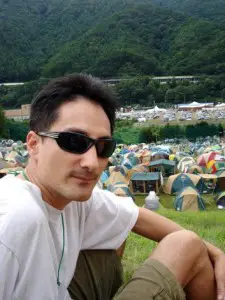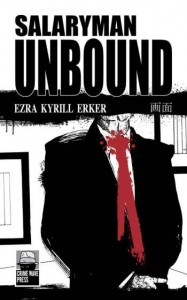 Ezra Kyrill Erker is an author, journalist and traveler from Berlin, Germany, who calls Bangkok, the Thai capital, his adoptive home. In this interview he talks about his latest novel Salaryman Unbound, his fascination for Japan, and the publishing industry.
Ezra Kyrill Erker is an author, journalist and traveler from Berlin, Germany, who calls Bangkok, the Thai capital, his adoptive home. In this interview he talks about his latest novel Salaryman Unbound, his fascination for Japan, and the publishing industry.
Voicu Mihnea Simandan: Where did your interest in Japan originate?
Ezra Kyrill Erker: I didn’t have much interest in the country before I got there. A short visit to the Japan Alps felt very comfortable and turned into a longer stay, which before I knew it had become eight years. Once I’d overcome some of the language hurdle it was the only place I’d visited where people listened more than they spoke, and I found that very liberating. You didn’t have to keep repeating yourself or overemphasize; all the energy elsewhere spent struggling to communicate could be put to better use here. Good Japanese literature reflects that terse style where much more is conveyed and implied than the words you see on the page.
VMS: As you’re based in Bangkok, do you return or visit Japan often?
EKE: I go back about every other year. Bangkok has a huge Japanese community, so it doesn’t feel very far away.
VMS: You lived and worked in Japan for many years. Did you become one of their ‘salarymen’?
EKE: I taught at a national university, so had more holidays than most, but you find yourself adopting the local work ethic. No one wants to be the first to go home for the day. Calling in sick is almost unheard of. You don’t have the aids you might have in academia elsewhere, such as substitutes, teacher’s assistants, proctors; you do it all yourself, which for me included designing lessons, writing textbooks and tests, marking the papers. You spend a lot of nights, weekends and holidays just catching up on paperwork. And in a broader social context, you find yourself apologizing for things beyond your control. By the end I’d even catch myself bowing on the telephone!
VMS: In Salaryman Unbound (Crime Wave Press, 2014) you look at the effects of middle age an unhappy Japanese man. What inspired you to write this novel?
EKE: The novel is set in a provincial town, where neighbours watch what you’re up to and you can’t escape into anonymity. Actually I first wrote the book with a US setting, an American nightmare of sorts, but the sense of existential crisis wasn’t quite urgent enough. The story became more real to me when I moved it to Japan because there a company isn’t just an employer but a community you base your identity around. So if you wake up one morning and realize you’ve done nothing with your life, there’s not that much you can do about it. You have greater social constraints, you can’t have a public midlife meltdown, so it makes sense that one way to overcome a growing sense of impotence in life might be through a very calculated crime.
 VMS: Japan has a long-standing tradition of crime fiction (I’m thinking Japanese writers). How does your book fit into the latest trends? Or does it?
VMS: Japan has a long-standing tradition of crime fiction (I’m thinking Japanese writers). How does your book fit into the latest trends? Or does it?
EKE: Yes, you had masters like Akutagawa, who combined Eastern and Western influences and could create an entire dark epic within a short story. Then came popular writers like Edogawa Ranpo, a pseudonym that in katakana sounds almost the same as Edgar Allan Poe, and crime fiction became very popular in Japan. The stories that have survived the longest, or the ones I enjoyed most, are often told from the point of view of the perpetrator, and you find yourself identifying with them and hoping they get away with it. In that sense Salaryman Unbound fits the mould, with less of an emphasis on a hardboiled detective or standardized genre format, though the psychological and existentialist aspects might seem a little more European.
VMS: Your first book, A Bridge of Dreams: Asian Tales (Orchid Press, 2013), was published solely as a paperback while your current novel is available as an ebook only. How has your life as a published author been influenced by the prominence of ebooks in today’s book market?
EKE: Eventually they’ll both be available in various formats; publishers often start with what’s more convenient or comfortable for them, and these are two very different books. To be honest, I’ve never read an e-book. Most people would still rather take a paperback to bed or the beach with them than a Kindle, and that’s the format I instinctively assume I’m writing for. But publishing is undergoing a lot of changes, and advancing technology means people also read differently, perhaps less patiently. If you want your voice to be heard you may have to adapt your approach.
VMS: What book are you working on right now?
EKE: I’m finishing up a long coming-of-age love novel that’s also set in Japan, and am working on a mystery set in southern Thailand – less hardboiled, more scrambled.
VMS: Thank you for your time.
